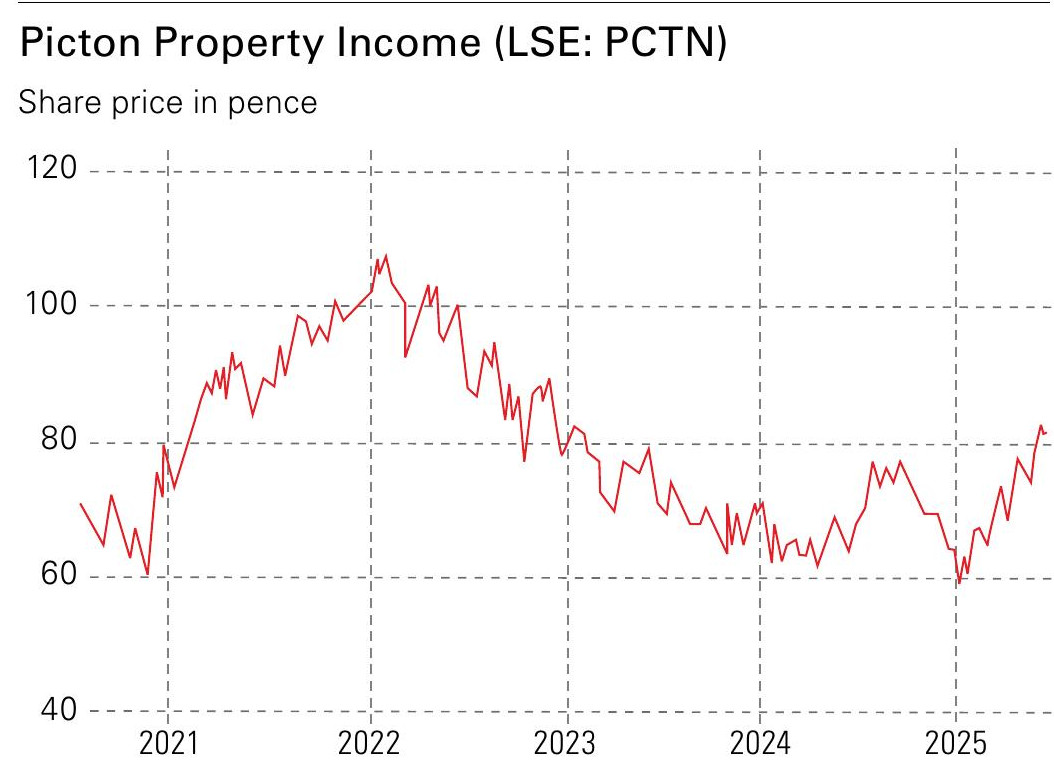Picton Property: a deep-value property play
Picton Property has all the qualities of a future takeover target


Get the latest financial news, insights and expert analysis from our award-winning MoneyWeek team, to help you understand what really matters when it comes to your finances.
You are now subscribed
Your newsletter sign-up was successful
Want to add more newsletters?

Twice daily
MoneyWeek
Get the latest financial news, insights and expert analysis from our award-winning MoneyWeek team, to help you understand what really matters when it comes to your finances.

Four times a week
Look After My Bills
Sign up to our free money-saving newsletter, filled with the latest news and expert advice to help you find the best tips and deals for managing your bills. Start saving today!
There has been a jump in takeover activity in the real-estate investment trust (Reit) sector over the past six months. Recently, Tritax Big Box Reit (LSE: BBOX) announced a £485 million takeover of Warehouse Reit (LSE: WHR), outbidding private-equity giant Blackstone. Under the terms of the deal, Warehouse’s shareholders will receive 0.4236 new Tritax shares and 47.2p in cash per share, plus upcoming Warehouse dividends due in July and October.
The deal will create a £7 billion giant and one of the largest single owners of warehouses in the UK. The deal followed what seems to be the final instalment of the battle between private-equity giant KKR and Primary Health Properties (LSE: PHP) over the latter’s peer Assura (LSE: AGR).
After months of negotiation, Assura has agreed to merge with PHP to create a £6 billion, predominantly healthcare-focused, property portfolio. Assura’s shareholders will receive 0.3865 new PHP shares and 12.5p in cash for each share, along with a special dividend of 0.84p. PHP’s offer values each Assura share at 55.0p, when including declared dividends, and values the company at roughly £1.79 billion.
MoneyWeek
Subscribe to MoneyWeek today and get your first six magazine issues absolutely FREE

Sign up to Money Morning
Don't miss the latest investment and personal finances news, market analysis, plus money-saving tips with our free twice-daily newsletter
Don't miss the latest investment and personal finances news, market analysis, plus money-saving tips with our free twice-daily newsletter
These deals have been driven by necessity as Reits strive to bulk up to remain independent. The synergies achieved from any deal are usually relatively small in comparison with the values involved. Instead, Reits are seeking scale to fend off predators and reduce their cost of capital, as well as to appeal to a larger audience of investors.
Most analysts believe this trend will continue. Sub-£1 billion market capitalisation Reits are struggling to attract investors and are trading at deep discounts to net asset value (NAV). That makes it hard to raise capital and makes them appealing to private-equity buyers. For smaller, patient investors, there are currently some fantastic opportunities on the market, but these aren’t expected to last long as the sector continues to consolidate.
Picton Property: in safe hands
The £430 million Picton Property Income (LSE: PCTN) owns and actively manages a £723 million commercial-property portfolio, comprising 47 assets with roughly 350 occupiers across London and the southeast. At the end of the last financial year, its NAV was £533 million, or 100p per share, compared with the current share price of 81p. Unlike many other Reits, Picton is internally managed (rather than paying a fee to an outside third-party manager). Michael Morris is the current CEO and has held this position since 2012. He’s worked with the business since 2005 and during that time has seen multiple property cycles.
Over the past two years, like many other Reits, Picton has shifted away from office space as the post-pandemic return to the office has proved difficult. The group has rotated into industrial assets with the proceeds, as well as using cash to reduce debt.
In early 2024, the group sold its largest office asset, Angel Gate in central London, for £29.6 million, 5% ahead of the 31 December 2023 valuation of £28.1 million as a residential asset. After completion, the group’s exposure to office assets fell from 30% to 28% (it has since fallen to 25%). Office sales have totalled £51 million at an average premium to book value of 5%, although that’s off the back of several years of sub-par returns. In 2025, the value of the group’s office portfolio fell 5% on a like-for-like basis.
A shift into industry
Two-thirds of the group’s portfolio consists of industrial assets such as Parkbury industrial estate, Radlett (Picton’s largest asset), acquired in 2014, and River Way industrial estate, Harlow, acquired in 2006. In 2025, occupancy in this part of the portfolio was 99%. Demand is high for these assets because they are no longer being built.
Industrial parks are an integral part of the UK logistics network, but it takes years to push them through the planning system. As a result, demand is outpacing supply and is expected to continue to do so for the foreseeable future.
Across the company’s portfolio, it was able to push through rent rises of between 8% and nearly 40% last year, in situations where leases were coming up for renewal. Picton has projected an estimated rental value (ERV) for the industrial portfolio at roughly 15% above current levels. Management expects to push through further rent rises as contracts come up for renewal.
Picton Property’s quality portfolio
Picton’s capital allocation strategy differs from many of its peers. Typically, a Reit must distribute at least 90% of its property income and profits to shareholders each year to retain its tax benefits, which usually leaves little money for other purposes. Picton has adopted a conservative approach that still meets this target. Its dividend cover has averaged 113% over the past three years.
It has used the remaining cash as well as income from property sales for debt repayments, select acquisitions and share buybacks. Last year, £11.8 million was invested in the portfolio to boost occupiers’ amenities and environmental credentials, while £0.5 million was spent on an industrial property close to an existing asset. Gearing was cut to 24%, with the remaining borrowing maturing in 2031 and 2032, with fixed interest rates averaging 3.7% (compared with the equivalent yield of 6.8% in the property portfolio). Picton has also announced a £17.5 million share buyback – a sensible capital allocation choice with the shares trading at such a deep discount to NAV.
Since 2020, UK Reits have had to navigate a challenging environment, but recent deals show deep-pocketed investors now see value in this downtrodden segment of the market. With its 4.7% yield, low level of gearing, a quality portfolio set for growth, and a discount to NAV, Picton is one of the better plays in the sector.

This article was first published in MoneyWeek's magazine. Enjoy exclusive early access to news, opinion and analysis from our team of financial experts with a MoneyWeek subscription.
Get the latest financial news, insights and expert analysis from our award-winning MoneyWeek team, to help you understand what really matters when it comes to your finances.

Rupert is the former deputy digital editor of MoneyWeek. He's an active investor and has always been fascinated by the world of business and investing. His style has been heavily influenced by US investors Warren Buffett and Philip Carret. He is always looking for high-quality growth opportunities trading at a reasonable price, preferring cash generative businesses with strong balance sheets over blue-sky growth stocks.
Rupert has written for many UK and international publications including the Motley Fool, Gurufocus and ValueWalk, aimed at a range of readers; from the first timers to experienced high-net-worth individuals. Rupert has also founded and managed several businesses, including the New York-based hedge fund newsletter, Hidden Value Stocks. He has written over 20 ebooks and appeared as an expert commentator on the BBC World Service.
-
 Can US small caps survive the software selloff?
Can US small caps survive the software selloff?US stocks have made their worst start to a year since 1995 relative to a global benchmark. But experts think some sectors of the market are still worth buying.
-
 Review: Eliamos Villas Hotel & Spa – revel in the quiet madness of Kefalonia
Review: Eliamos Villas Hotel & Spa – revel in the quiet madness of KefaloniaTravel Eliamos Villas Hotel & Spa on the Greek island of Kefalonia is a restful sanctuary for the mind, body and soul
-
 Three key winners from the AI boom and beyond
Three key winners from the AI boom and beyondJames Harries of the Trojan Global Income Fund picks three promising stocks that transcend the hype of the AI boom
-
 RTX Corporation is a strong player in a growth market
RTX Corporation is a strong player in a growth marketRTX Corporation’s order backlog means investors can look forward to years of rising profits
-
 Profit from MSCI – the backbone of finance
Profit from MSCI – the backbone of financeAs an index provider, MSCI is a key part of the global financial system. Its shares look cheap
-
 'AI is the real deal – it will change our world in more ways than we can imagine'
'AI is the real deal – it will change our world in more ways than we can imagine'Interview Rob Arnott of Research Affiliates talks to Andrew Van Sickle about the AI bubble, the impact of tariffs on inflation and the outlook for gold and China
-
 Should investors join the rush for venture-capital trusts?
Should investors join the rush for venture-capital trusts?Opinion Investors hoping to buy into venture-capital trusts before the end of the tax year may need to move quickly, says David Prosser
-
 Food and drinks giants seek an image makeover – here's what they're doing
Food and drinks giants seek an image makeover – here's what they're doingThe global food and drink industry is having to change pace to retain its famous appeal for defensive investors. Who will be the winners?
-
 Barings Emerging Europe trust bounces back from Russia woes
Barings Emerging Europe trust bounces back from Russia woesBarings Emerging Europe trust has added the Middle East and Africa to its mandate, delivering a strong recovery, says Max King
-
 How a dovish Federal Reserve could affect you
How a dovish Federal Reserve could affect youTrump’s pick for the US Federal Reserve is not so much of a yes-man as his rival, but interest rates will still come down quickly, says Cris Sholto Heaton